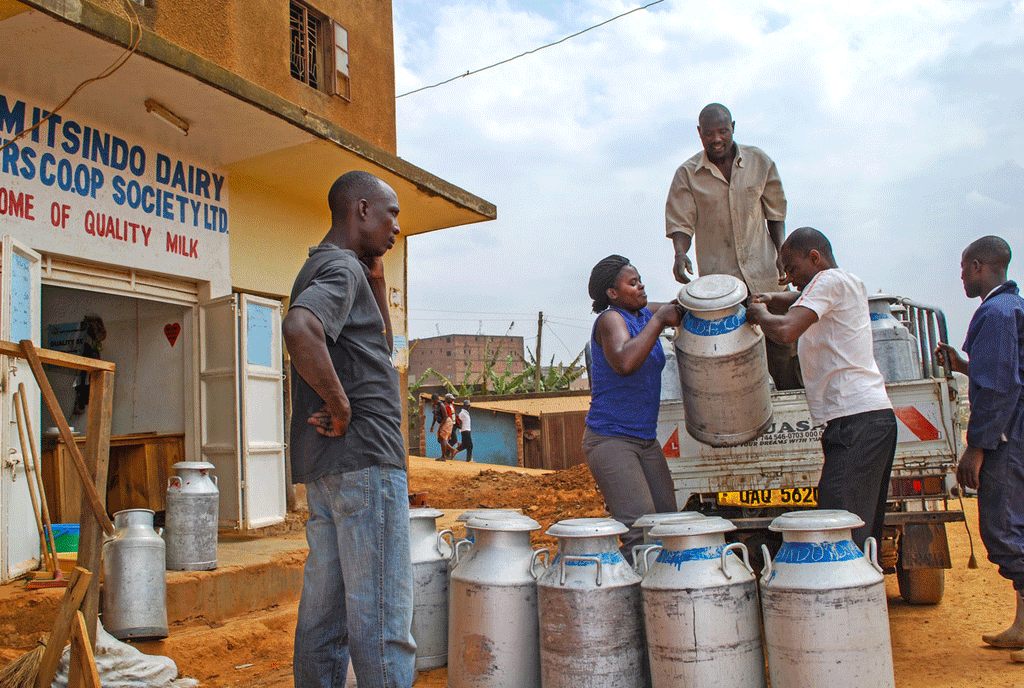
Milk processing at Brookside dairy factory in Ruiru, Kiambu County, Kenya. Kenyan authorities are still fighting claims that they have withheld permits from Brookside Dairies Uganda. PHOTO/FILE/NMG
A recent East African Business Council meeting in Kigali heard how Tanzania was making the sale of milk from Rwanda near futile by introducing levies that made the trade unprofitable, against the tenets of the East African Community (EAC) Common Market.
Rwandan traders claimed that Tanzania was charging $1 for each litre of milk, raising the cost and discouraging imports.
Milk exported to Tanzania attracts numerous charges collected by different institutions, such as the Tanzania Bureau of Standards, Tanzania Foods and Drugs Authority and Tanzania Dairy Board.
Under Tanzania’s Animal Diseases and Animal Products Movement Control Regulations published on August 31, 2018 (Government Notice No 476) Dodoma demands Tsh2,000 ($0.74) on milk imported from outside the country, from Tsh150 ($0.056) -- a 1,233 percent increase.
Abdoul Ndarubogoye, a member of the EABC Rwanda chapter, said a lot of milk from Rwanda is sold in the northern part of Tanzania and in Kenya, “but there are too many NTBs.”
Tanzania denied creating barriers to the trade, with the Tanzania Dairy Board saying no Rwandan company had applied for a licence to export milk there.
But it is not Tanzania alone that has been protectionist in the dairy sector – it is an EAC-wide problem to which the secretariat, the Heads of State Summit, and other organs have been seeking a solution.
Rwanda itself has previously blocked milk from Uganda, and Kenya has used issuance of permits to block milk from Uganda.
Rwandans say they are incurring high costs as a result of delays in the issuance of import licences by the Kenya Dairy Board, thereby increasing the cost of marketing its milk beyond its borders.
Presidents Paul Kagame of Rwanda, Uganda’s Museveni and Kenya’s William Ruto are all big cattle keepers, and have been trying to institute measures to resolve the years-long impasse over trade in dairy products.
Last May, Museveni visited Kenya and held bilateral talks with Ruto and, in their joint communique, directed their officials “to respect and fully implement the EAC Customs Union Protocol and Common Market Protocol.”
They further directed that there be no more quotas on goods originating from EAC partner States such as dairy and dairy products, poultry and poultry products, cereals, sugar, juices, pishori rice and furniture.
EAC Secretary-General Veronicah Nduva concedes that these directives are yet to be implemented due to lack of a political will and failure by the respective ministries to be appraised of the matter.
“Despite the political will exhibited by the two Heads of State (Ruto and Museveni), some products still do not enjoy market access within the region,” Ms Nduva told The EastAfrican.
“There is a need for more frequent engagement at the political level, as well as effective feedback mechanisms to communicate the implementation of residential directives. This responsibility lies with the Ministries of East African Community Affairs and/or Foreign Affairs.”
Industry players have particularly cited the plight of Brookside Dairy Uganda, which continues to be blocked from the Kenyan market.
Some of these trade wars surround individual politicians and regime policies. For example, while Brookside remains blocked, Pearl Diaries and Amos Diaries products are allowed in Kenya.
During the reign of Uhuru Kenyatta, whose family dominates the dairy sector in Kenya and owns Brookside Uganda, Pearl saw their products blocked from Kenya, but now enjoys market access, a development that has seen it increase the Uganda powder milk plant capacity and acquire a packing plant in Kenya.
Pearl Dairies’ parent company Maziwa also signed a deal with the State-owned financier Kenya Development Corporation (KDC) to invest jointly in dairy ventures.
Through Maziwa, the non-operating holding company incorporated in Mauritius will acquire Highland Creamers & Food Limited — a Kisii-based firm that is behind the Family Milk brand.
In Uganda, Maziwa collects, processes and sells milk and milk products under its subsidiary Pearl Dairy Farms Limited. It has been depending on the Kisii firm to sell its products in western Kenya.
With Kenyan authorities still fighting off claims that it has withheld export permits to Brookside Dairies Uganda, the management’s hopes of regaining the Kenya market have waned and they are now looking for local market as well as exports to South Sudan and DR Congo.
“I have given up applying for permits to save the Ksh5,000 ($38.75) fee I pay, which has accumulated without KDB (Kenya Dairy Board) issuing the permits,” said Benson Mwangi, Brookside Dairy Uganda general manager.
The firm says it submitted 114 applications for milk export permits, but none was cleared by the Kenyan authorities.
EABC board member Stewart Mwesigwa, says KDB’s continued blockade of Uganda’s milk is defiance of President Museveni and Ruto directive and hurts the smallholder farmer most, with reports from upcountry showing raw milk prices remained suppressed. They have not crossed Ush1,300 ($0.3) per litre.
“As East African Business Council we have always encouraged member States to open up their markets for competition. We have always told member States to stop thinking small.
If you are Ugandan and start thinking about only Uganda, how can you ever grow? You are limiting your opportunities, horizon and advantages,” Mwesigwa said.
KDB managing director Margaret Kibogy denies that her body is responsible for the current milk wars with Uganda.
“Claims that we have blocked Ugandan milk, are rumours. I only see/read Brookside in the press complaining and I called them to find out what is happening. We are happy to state that we have resolved our issues with Uganda. You know it is our good trading partner. We don’t have an issue with them. They take our products, we take their products,” Ms Kibogy told The EastAfrican.
Yet Secretary-General Nduva acknowledges the increased trade rivalry among Kenya, Uganda, Rwanda and Tanzania, over milk, saying the regulatory agencies are partly to blame for being slow in granting permits.
“Most partner States established agencies to regulate trade in milk and milk products, such as the Kenya Dairy Board, Tanzania Dairy Board and Uganda Dairy Board. These agencies, along with others in different partner States, control the issuance of import permits for milk from other regions. The milk sector is governed by Acts and regulations developed by regulatory agencies in all Partner States. However, many of these dairy boards exhibit a slow response rate to requests for permits,” she said.
Data from the EAC shows that the region earned $269 million in 2023 and another $84 million in the first half of 2024 in intra-EAC dairy products trade.
Tanzania is the leading producer and exporter of milk in the region, with exports worth $50 million, followed by Kenya with exports valued at $14 million.
The major market leaders in the first half of 2024 were Tanzania, Kenya, Uganda, and Rwanda respectively
The EAC boss says trade in milk powder has presented challenges over the enforcement of rules of origin, a major factor in the spat between Kenya and Uganda.
“Raw milk is typically not affected by Rules of Origin issues, since it qualifies under the wholly produced criteria. However, milk powder presents challenges due to difficulties in distinguishing between milk powder imported from outside the region and that which has been repackaged for export within the partner States,” Ms Nduva explained.
“Concerns have been raised among partner States regarding this issue, which hinders the free circulation of milk powder in the region and affects the granting of preferential rates.”
“The EAC Secretariat supports engagements among partner states through joint verifications to assess production capacity as a means of confirming the origin of the products,” she added.
Apart from milk, Uganda has raised concerns that Kenya is yet to fully allow agricultural products, including sugar, eggs and poultry products access to the Kenyan market.
“So far, they have not resumed exports to a level that can comfortably confirm that the situation is back to normal,” said Simon Kaheru, EABC Vice-Chairperson. “Unfortunately, the processes involved in trade are not the simple switch-on, switch-off kind. Everybody is being cautious because of the bad experiences that keep recurring.”
According to the KDB, the sector provides livelihood to an estimated 1.8 million smallholder households, employing an estimate of 750,000 persons directly and 500,000 indirectly.
But Kenya has continued to seek other markets as its milk has on occasion been blocked from Tanzania.
“We export our milk not only to Tanzania, but also Ethiopia, Somalia, South Sudan and Uganda. We sell ice cream to Uganda,” Ms Kibogy said. “But since we held bilateral talks, Tanzania is opening up to our milk products.”
Last year, after a meeting with Kenya’s then Trade Cabinet Secretary Moses Kuria and President Museveni in Kampala, Kenya allowed importation of milk from Uganda, the traders and farmers in the two countries were happy. For a while.
Mr Kuria said: “As we move towards the Tripartite Free Trade Agreement and the merger of EAC, Comesa and SADC, Kenya and Uganda will walk that journey together and ultimately into AfCFTA.”
President Ruto had earlier promised to normalise the trade relations between the two partners.
Uganda imports processed dairy products from Kenya. Data from the Dairy Development Agency, a body facilitating milk production and trade in Uganda, indicates that at least Ush11.5 billion ($3.1 million) was spent on importing milk powder, UHT, butter, cheese, infant formula, yoghurt, ice cream from Kenya in the 2022-2023 financial year.
Uganda exported butter, cheese, ghee, UHT, yoghurt, milk powder worth Ush810.5 billion ($220.8 million).
Kenya has the highest per capita milk consumption in sub-Saharan Africa, at 110 litres. The demand, currently at eight billion litres is also expected to grow with the population increase. Kenya's annual production of milk is estimated at 5.2 billion litres against Uganda’s 5.4 billion litres.
The Food and Agriculture Organisation data shows the per capita consumption of milk in Uganda is about 40 litres, which could explain why authorities in Kampala have chosen always to negotiate to relax the protectionist measures hurting intra-regional trade, as opposed to retaliatory proposals from the private sector.
“It is very unfortunate that Heads of State meet in boardrooms. State Houses pass good policies for our community to grow and then people down the line do not actually implement,” said Uganda’s Agriculture minister Frank Tumwebaze.
He said they had left the issue to be handled by the regional bloc, although the ministry in charge of East African affairs has not given any update on any action taken or in the pipeline.
Uganda East African Affairs minister Rebecca Kadaga had suggested retaliatory measures and blocking Kenya goods, which President Yoweri Museveni opposed, saying it would hurt regional trade.
Trade ministry officials said their focus is looking for other markets outside East Africa, especially in North, Southern and Central Africa.
Protecting domestic markets
Though Kenyan authorities have not come out clearly to say it, they seem to worry about cheap milk from Uganda. President Museveni has encouraged animal husbandry and his government has provided veterinary services which has been praised for the increase in the numbers of herds as well as milk production in the past 10 years, growing at a rate of 11 percent.
There are five milk processing plants in southwestern Uganda, the country’s leading milk producer.
For farmers in Kenya, especially in the Mt Kenya region, allowing Uganda milk means that the price of their milk will fall.
To the politicians, allowing Brookside Uganda milk is increasing former President Kenyatta’s control of the dairy sector in the country.
When sacked Deputy President Rigathi Gachagua and Ruto came to power, they announced a fight against cartels in Kenya’s commodities industry, citing the dairy sector, which he said needed to be liberated from “state capture.”
*Written by Luke Anami and Kabona Esiara





